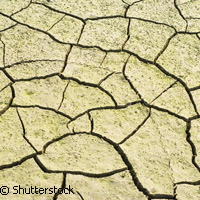Linking up extreme weather and climate change
EU-funded scientists are probing the links between extreme weather events and changes in the carbon budget of the European landmass. The scientists are working in a 4-year project called CARBO-EXTREME ('The terrestrial carbon cycle under climate variability and extremes - a pan-European synthesis'), which received EUR 3.3 million of its EUR 4.6 million budget form the EU through the Environment Theme of the Seventh Framework Programme (FP7). The project results will help improve climate models and will enable the EU and national governments to develop better climate and soil protection policies. Over half of the carbon dioxide (CO2) we emit is taken up natural 'carbon sinks'; terrestrial ecosystems soak up 29% of carbon emitted while the oceans absorb 26%. Europe's terrestrial ecosystems alone are estimated to absorb between 7% and 12% of fossil fuel emissions. These natural sinks therefore effectively buffer us from the worst effects of climate change. However, it appears that extreme weather events may affect terrestrial ecosystems' ability to absorb carbon. For example, the heat wave and drought that hit large parts of Europe in the summer of 2003 turned Europe's soils from a carbon sink into a carbon source. In fact, research reveals that our terrestrial ecosystems lost as much CO2 in just a few weeks that summer as they had absorbed from the atmosphere over the previous five years under normal weather conditions. Climate models show that extreme weather events such as droughts, heat waves and floods are likely to become more common as a result of climate change. This raises the worrying prospect of a positive feedback loop, with extreme events causing carbon to be released from natural systems, thereby further exacerbating climate change. The problem is that at the moment, our understanding of the impacts of these extreme weather events on carbon sinks remains poor, and so climate models do not take them fully into account. CARBO-EXTREME aims to address this issue. Its stated objectives are to enhance our understanding of the response of Europe's terrestrial carbon cycle to extreme weather events and climate variability in general; to identify the most sensitive carbon pools and processes; and to map the likely fate of carbon pools in Europe over the coming century. In addition, the project partners are also working to generate and integrate experimental data on different timescales and from different regions. CARBO-EXTREME has already yielded some interesting results. A study published in the journal Nature in January of this year revealed that positive feedback loops may not be as strong as the most pessimistic models predict. Nevertheless, some feedback should still be expected and the scientists emphasise that it is still imperative that we reduce our carbon emissions over the coming decades. More recently, July saw the publication of two major papers in the journal Science. In one paper, the scientists demonstrated that the total amount of carbon taken up by the world's plant life every year stands at 123 billion tonnes. Meanwhile, the second paper looked at the extent to which temperature influences the amount of carbon plants breathe out. The research revealed that ecosystems worldwide respond to short-term temperature variations in a similar way. However, the study also highlighted the fact that other factors, such as water availability, influence the long-term carbon balance of ecosystems. The CARBO-EXTREME partners are now gearing up for their first annual conference, which will be held at Risø DTU (Technical University of Denmark) on 13 to 15 September.
Countries
Denmark



